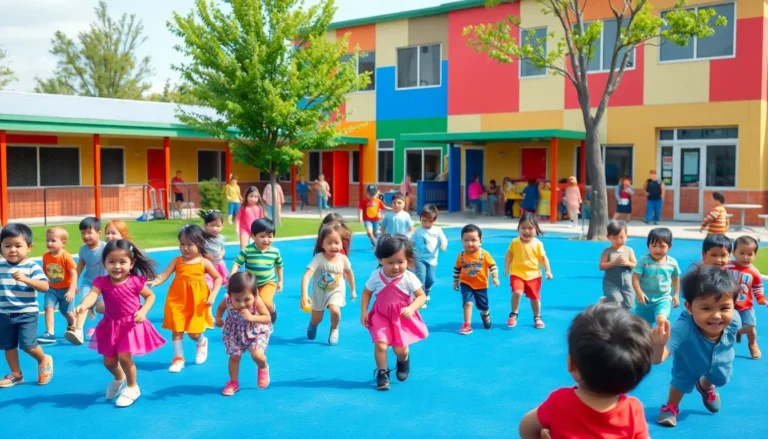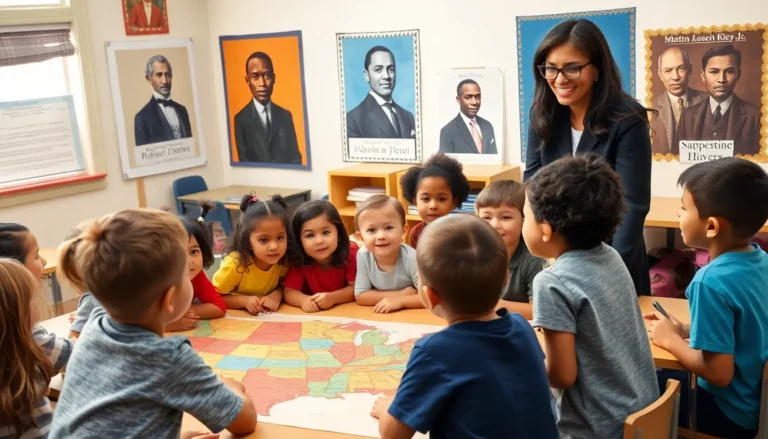Every year, schools roll out the red carpet for their star students, handing out awards like candy at a parade. From the coveted “Best in Math” trophy to the “Most Likely to Brighten Your Day” certificate, these accolades celebrate achievements that often go unnoticed. But let’s be honest—who doesn’t love a little recognition for their hard work, even if it comes in the form of a shiny piece of plastic?
School awards do more than just add bling to a student’s wall; they boost confidence, inspire peers, and create unforgettable memories. In a world where everyone’s vying for attention online, these awards remind students that real-life accomplishments deserve a spotlight too. So, whether it’s a gold star or a fancy plaque, let’s dive into the world of school awards and discover why they’re more than just a reason to smile for the yearbook photo.
Table of Contents
ToggleOverview Of School Awards
School awards play a vital role in recognizing student achievements and fostering a positive school environment. Various accolades celebrate individual and group accomplishments, motivating students to excel.
Importance Of School Awards
School awards serve as a powerful tool for motivation. They instill a sense of pride in students, encouraging them to strive for excellence. Recognition also boosts self-esteem, making students more confident in their abilities. Additionally, awards help create a culture of achievement within the school community. Encouraging healthy competition among peers strengthens relationships and enhances overall school spirit.
Types Of School Awards
Numerous categories of school awards exist, tailored to diverse achievements. Academic awards acknowledge excellence in subjects like math, science, and literature. Extracurricular awards honor achievements in sports, arts, and community service. Character awards recognize positive behavior traits such as leadership, kindness, and perseverance. Each type serves to validate different aspects of student life, ensuring all talents and contributions receive appropriate recognition.
Criteria For School Awards

School awards rely on clear criteria to ensure fair recognition of student accomplishments. The evaluation process focuses on students’ dedication and contributions in various fields.
Academic Achievements
Academic awards honor students who excel in subjects like math, science, and literature. Students demonstrating high grades, exemplary project work, or significant improvement often receive these distinctions. Schools may also consider standardized test scores as part of the assessment. Those who participate in advanced placement courses or specialized programs might gain additional recognition. Regular attendance and commitment to classroom engagement play a role in evaluating overall academic performance.
Extracurricular Contributions
Extracurricular awards celebrate students involved in clubs, sports, and community service. Participation in activities such as debate club, band, or athletic teams showcases leadership and teamwork skills. Dedicated service hours in volunteer activities reflect a student’s commitment to helping others. Consistent attendance at practices and meetings indicates reliability and passion. Schools might also recognize unique contributions during events or initiatives, highlighting the importance of well-rounded development.
Impact Of School Awards
School awards significantly contribute to student development and school culture. They recognize achievements, fostering a supportive environment that encourages excellence.
Motivational Benefits For Students
School awards inspire students to reach their full potential. Recognition boosts confidence, leading to increased effort in academics and extracurricular activities. Students who receive accolades often report greater satisfaction with their school experience. Awards also encourage friendly competition, prompting peers to strive for personal bests. Acknowledgment of hard work creates a cycle of motivation that empowers students to set and achieve goals. The desire to earn recognition can drive students to engage more fully in their studies and community activities.
Enhancing School Culture
School awards enhance the overall culture within educational institutions. Acknowledging achievements fosters an inclusive environment where all talents are valued. Celebrations of success promote unity among students and staff, creating stronger relationships. Positive reinforcement from awards cultivates a sense of belonging, making students feel connected to their school community. Additionally, a culture of recognition encourages students to support one another, contributing to a more caring atmosphere. The visibility of achievements encourages others to demonstrate their abilities, creating a thriving culture of achievement.
Controversies Surrounding School Awards
Controversies surrounding school awards often ignite debate regarding fairness and representation. Critics question whether award systems adequately recognize diverse student contributions.
Equity And Fairness Issues
Equity issues arise when awards favor certain groups over others, leading to feelings of exclusion among students. Many argue that traditional criteria, such as standardized test scores, often disadvantage underrepresented students. Schools sometimes overlook diverse talents, which can create disparities in recognition. Fairness in awarding can also suffer from bias in the selection process. Ensuring transparency in how awards are determined helps address these concerns. Schools that involve students in evaluating criteria often create a more equitable environment. By adapting awards to reflect the diversity of student achievements, schools foster inclusivity.
Alternative Recognition Methods
Alternative methods for recognition are gaining traction as schools seek to address concerns about traditional awards. Programs like peer-to-peer recognition allow students to nominate and celebrate each other’s achievements. Utilizing public displays of accomplishments helps spotlight various student contributions beyond awards. Acknowledging individual growth through personalized certificates builds self-esteem. Schools that adopt a holistic approach consider a broader range of skills and attributes, celebrating unique talents. Community-based recognition initiatives connect students with local organizations, fostering real-world engagement. Exploring these alternatives can create a more comprehensive acknowledgment system, enhancing the school environment.
School awards play a crucial role in shaping student experiences and fostering a vibrant school culture. By recognizing achievements both big and small they not only celebrate individual efforts but also inspire others to strive for excellence. These accolades contribute to a supportive environment where students feel valued and motivated to engage more deeply in their academic and extracurricular pursuits.
As schools continue to evolve it’s essential to ensure that award systems are fair and inclusive. Embracing diverse methods of recognition can help create a more equitable atmosphere that honors all contributions. Ultimately school awards serve as a powerful reminder of the importance of acknowledging hard work and dedication in nurturing a thriving educational community.




